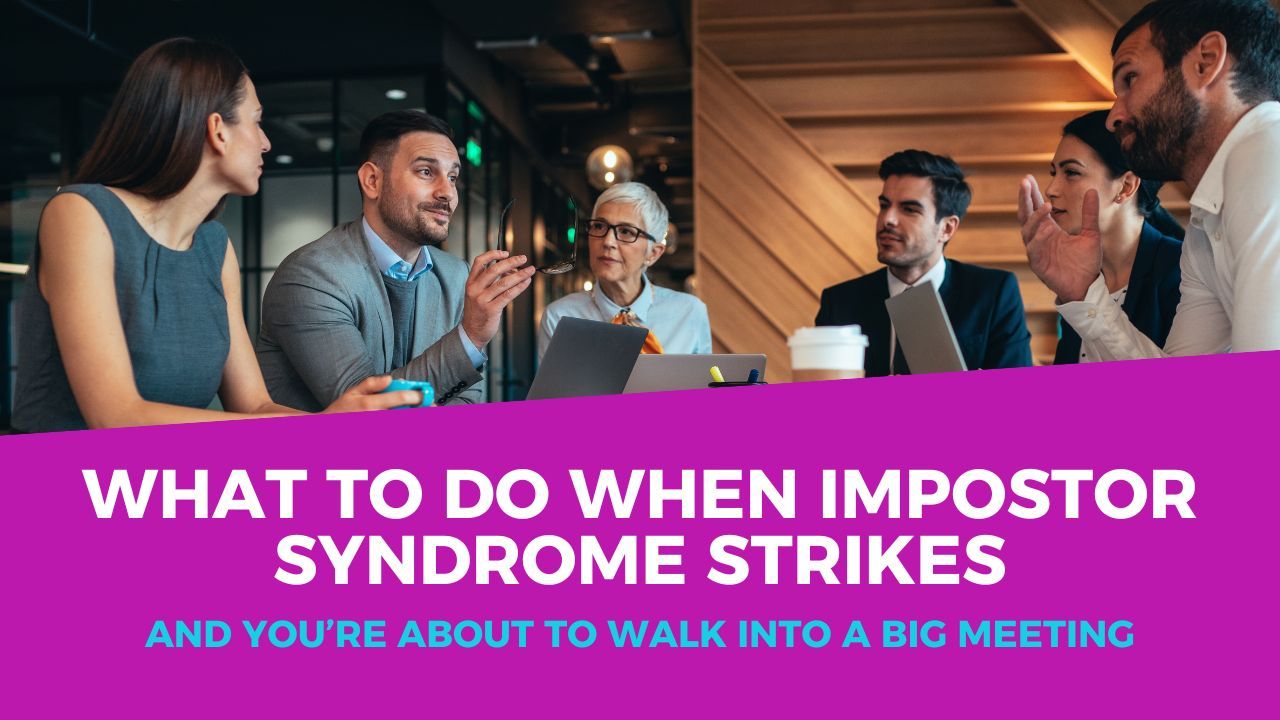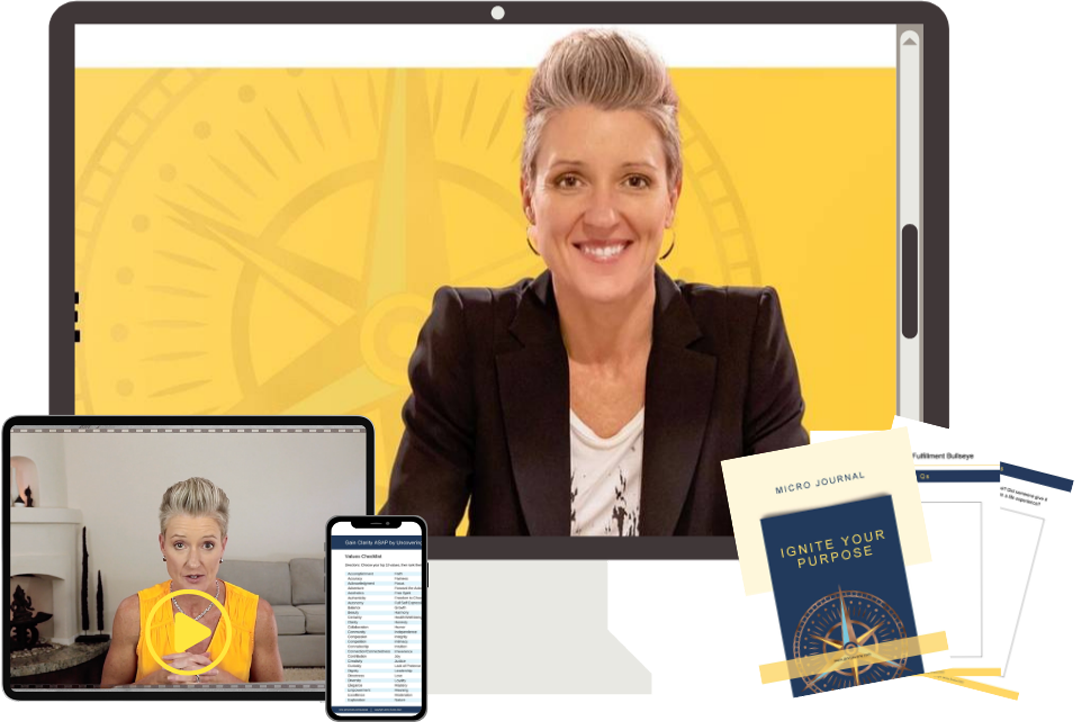What to Do When Impostor Syndrome Strikes (And You’re About to Walk into a Big Meeting)
Nov 04, 2025
You know the moment.
You’re walking toward the conference room—or waiting for that Zoom camera to turn on—and your inner narrator starts whispering:
“You don’t belong here.”
“They’re about to realize you have no idea what you’re doing.”
“Why did they even ask you to lead this?”
Your heart rate ticks up. Your palms start sweating. The logical part of your brain—the part that knows you’re qualified, capable, and prepared—starts losing ground to a surge of self-doubt that feels almost physical.
Congratulations. You’re human.
And you’re about to learn what’s really happening when impostor syndrome shows up uninvited.
You’re Not Broken—You’re Biochemical
Let’s start with this truth: impostor syndrome isn’t a personality flaw. It’s a body response.
When you walk into a high-stakes situation, your brain’s ancient threat system wakes up like it’s clocking in for a night shift. It releases a cocktail of stress hormones—adrenaline and cortisol—to keep you alert and “safe.”
Except the danger isn’t a charging lion.
It’s visibility.
Being seen, evaluated, or judged by others lights up the same neurological circuits as physical threat. Your biology can’t tell the difference between being chased and being chosen.
So that swirl of anxiety, second-guessing, and physical tension?
That’s not proof you’re an impostor.
That’s proof your nervous system is doing its job—it’s just using the wrong playbook for modern life.
And here’s the kicker: the more you care, the stronger the response. High performers experience this chemistry more often precisely because they push limits, take risks, and step into stretch zones. Your body isn’t betraying you—it’s confirming that you’re in the arena, doing meaningful, high-impact work.
Confidence Isn’t a Mindset—It’s Chemistry
Here’s the mistake most people make: they try to think their way out of impostor syndrome.
They tell themselves, “Just be confident.”
They repeat affirmations.
They over-prepare.
And sometimes it works—for about five minutes.
Because confidence isn’t created in your thoughts; it’s created in your chemistry.
When stress hormones flood your system, the logical part of your brain—the prefrontal cortex—literally goes offline. That’s why your mind blanks, your words stumble, or your heart races even though you “know better.”
You can’t positive-think your way past a chemical cascade.
You have to reset it.
The secret is understanding that your body drives your brain, not the other way around. When you shift your physiology first—through breath, movement, or focus—your biochemistry follows. Confidence is a result of regulation, not wishful thinking.
Learn to control your chemistry, and your mindset will naturally fall into place.
How to Reset in Real Time (Even in the Hallway Before the Meeting)
These tools aren’t fluffy or theoretical. They’re backed by physiology and proven in high-pressure environments—from boardrooms to Olympic teams.
Each one takes less than a minute.
1. Breathe Like a Leader, Not a Sprinter
When stress hits, your breathing gets shallow and fast, which tells your brain you’re in danger. Reverse it.
-
Inhale for a slow count of four.
-
Exhale for a count of six.
-
Repeat three times.
That longer exhale activates the parasympathetic nervous system—your body’s built-in calm switch—and floods your bloodstream with carbon dioxide that actually drops your heart rate.
Result: You feel centered, not spun out.
2. Shift the Spotlight
Impostor syndrome thrives on self-focus: “What if I mess up?” “What will they think of me?”
Flip it.
Ask: “Who needs to hear this today?” or “How can I help this team win?”
Shifting from self-protection to service triggers oxytocin—the bonding hormone—and quiets the stress loop in your amygdala.
Your physiology literally changes when you focus on connection instead of fear.
Result: You project calm authority because your chemistry says you’re safe.
3. Move Before You Meet
If you can, take 30-60 seconds to move your body: do some high knees, air squats, a few jumping jacks, or take a brisk walk down the hall.
Movement increases oxygen and glucose delivery to the brain in less than a minute, which clears fog and boosts focus.
It also metabolizes stress hormones so they don’t hijack your system mid-presentation.
Result: You enter the room with presence instead of panic.
4. Anchor to Evidence, Not Emotion
When self-doubt spikes, your brain deletes evidence of competence.
Bring it back online.
Remind yourself—out loud if you can—of a few data points that prove you belong here:
-
A project you led that succeeded.
-
Positive feedback you’ve received.
-
Skills or insights you bring that no one else does.
You’re not bragging—you’re giving your brain the proof it needs to shut down false alarms.
Result: You replace anxiety with accuracy.
What to Do After the Meeting
Here’s the thing about impostor syndrome—it’s rarely a one-time event.
It’s a cycle.
After the meeting ends, take two minutes to cement the win.
-
Reflect: What went well?
-
Record: Capture one quote, outcome, or compliment.
-
Reward: Do one micro-recovery—stretch, deep breath, short walk—to let your brain associate performance with pleasure, not stress.
This simple practice rewires your stress-success loop.
Next time, your body remembers: We’ve done this. We survived. We can do it again.
If You Remember Nothing Else, Remember This:
You don’t need to feel confident to act confident.
You need to manage your chemistry long enough for confidence to catch up.
The pros aren’t fearless—they’re fluent in recovery.
They know how to burn hot without burning out.
And so can you.
Build Chemistry, Not Just Confidence
Impostor moments are your body’s way of asking for a reset, not proof that you’re failing.
If you’re ready to stop fighting your biology and start working with it, begin by exploring my free science-based tools and trainings designed to help you build lasting focus, clarity, and confidence—so your best self isn’t a lucky moment; it’s your new normal.


